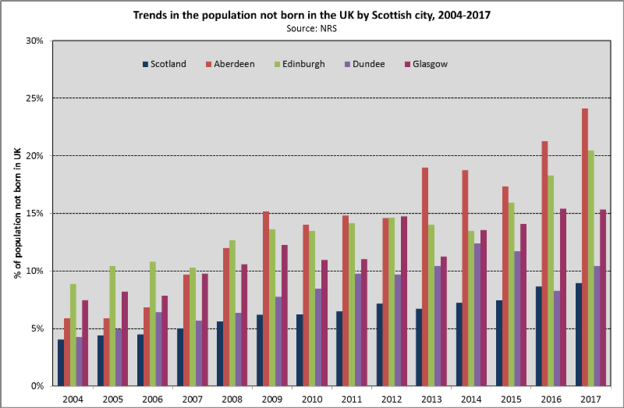Country of birth trends
Population trends for people not born in the UK by Scottish City
Click on graph to enlarge
The percentage of people in the Scottish population not born in the UK has risen steadily over the last 13 years from 4% in 2004 to 9% in 2017. Increases in the non-UK born population have occurred across all of Scotland's larger cities. In Glasgow the non-UK born population has risen from 7.5% in 2004 of the total population to 15.3% in 2017. Of the Scottish cities, Aberdeen has the highest proportion of non-UK born people in its population (24.1%).
Notes on data
The population estimates for country of birth are based on the Annual Population Survey (APS), which is the Labour Force Survey (LFS) plus various sample boosts which are included to enhance geographical coverage.
The LFS:-
- excludes students in halls who do not have a UK resident parent.
- excludes people in most other types of communal establishments (e.g. hotels, boarding houses, hostels, mobile home sites, etc).
- is grossed to population estimates of those living in private households. An adjustment is made for those who live in some NHS accommodation and halls of residence whose parents live in the UK. For this reason the sum of the British and non-British nationality estimates may not agree with the published population estimate.
There are 95 per cent confidence limits published with these estimates, but for presentation purposes these are not shown.
For further information on these estimates go to the NRS website.
Additional Resources
-
ResourceThursday, 26 May 2011
Your Better Life Index
A new, interactive index allowing users to measure and compare their lives. -
ResourceSunday, 1 November 2009
Miniature Glasgow - Video
An extension of the GCPH's work profiling Glasgow's health, produced in collaboration with the International Future Forum. -
ResourceMonday, 3 April 2006
Let Glasgow Flourish
A comprehensive report on health and its determinants in Glasgow and West Central Scotland







